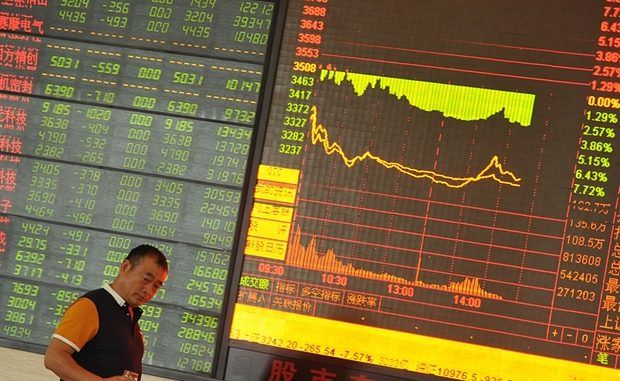
Chinese stocks plummeted Monday, erasing gains for the year, as fears about the deepening effects of a slowdown in the world’s No. 2 economy has rattled investors world-wide.
Shares, commodities and currencies under pressure across the globe as concern grows over China’s economy, and Beijing’s ability to handle the crisis
Chinese media were quick to dub today Black Monday.

BYPASS THE CENSORS
Sign up to get unfiltered news delivered straight to your inbox.
You can unsubscribe any time. By subscribing you agree to our Terms of Use
RT reports: The Shanghai composite has closed 8.5 percent in the red, as Beijing’s measures have failed to ease investor’s concerns about the slowdown of the world’s second-largest economy. China’s stocks are now down for the year after being up 60 percent in June.
“This is a real disaster and it seems nothing can stop it,” Chen Gang, Shanghai-based chief investment officer at Heqitongyi Asset Management Co., told Bloomberg. “If we don’t cut holdings ourselves, the fund faces risk of forced closure. Many newly-started private funds suffered that recently. I hope we can survive.”
Asian markets followed China with a broad selloff.
Japan’s Nikkei has closed 4.6 percent down. Hong Kong’s Hang Seng is 5.21 percent in deficit. Mumbai’s Sensex is down over 4 percent in late trading.
The ripple effects are being felt on the European markets.
London’s FTSE is down 2.5 percent in early trading. Germany’s DAX is losing over three percent, sliding below the 10,000-point mark for the first time since January.
The European stock markets have continued last week’s negative trend, when 13 out of 18 western European markets lost 10 percent or more, with Germany’s DAX Index down 18 percent. London’s FTSE 100 index suffered its biggest weekly drop in 2015, slumping 5.2 percent.
Commodities are down across the board with Brent oil trading at $44.22 as of 08:20 GMT, which is a six-and-a-half-year low.
The Russian ruble has hit new lows against major currencies, dragged down by both weak oil and Chinese stocks. The Russian currency was trading near 71 rubles against the dollar and 81.40 rubles against the euro as of 08:22 GMT.
Over the last month, the Chinese government has taken drastic measures to arrest the stock market’s decline. On Sunday, the Xinhua news agency reported that Beijing would allow its main state pension fund to invest up to 30 percent of its net assets in China-listed shares in the stock market for the first time.
In mid-August, the People’s Bank of China devalued the yuan over three consecutive days, stopping at 4.4-percent overall depreciation. The move intended to help faltering exports sowed panic in the world’s equity markets and may have started a new wave of currency wars.
The Chinese real economy has been showing signs of slowing growth. In a report published last Friday by Caixin and Markit, it became clear that manufacturing has been losing momentum. The Purchasing Managers’ Index (PMI), its key indicator, saw a fall to 47.1 from 47.8 in July. This is the lowest result since March 2009 and shows a contraction, as expansion starts from a rating of 50.
24 August 2015
08:46 GMTOn the European markets, London’s FTSE is down 2.52 percent in early trading. Germany’s DAX has shed 2.77 percent, while France’s CAC index is 2.68 percent lower.
08:29 GMTThe Russian ruble has hit new lows against major currencies, dragged down by both weak oil and Chinese stocks. The Russian currency was trading near 71 rubles against the dollar and 81.40 rubles against the euro as of 08:22 GMT.
07:47 GMTAs of 06:17 GMT, Brent oil was trading at $44.07 per barrel, which is a six-and-a-half-year low.


Be the first to comment